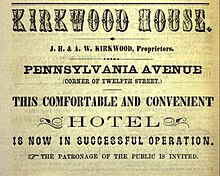
Pennsylvania Avenue is a primarily diagonal street in Washington, D.C. that connects the United States Capitol with the White House and then crosses northwest Washington, D.C. to Georgetown. Traveling through southeast Washington from the Capitol, it enters Prince George's County, Maryland, and becomes MD Route 4 and then MD Route 717 in Upper Marlboro, and finally Stephanie Roper Highway.
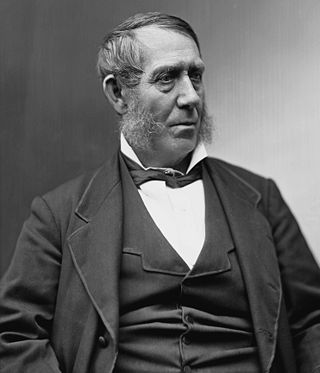
Samuel Jordan Kirkwood was an American politician who twice served as governor of Iowa, twice as a U.S. Senator from Iowa, and as the U.S. Secretary of the Interior.
The Radical Republicans were a faction within the Republican Party originating from the party's founding in 1854—some six years before the Civil War—until the Compromise of 1877, which effectively ended Reconstruction. They called themselves "Radicals" because of their goal of immediate, complete, and permanent eradication of slavery in the United States. They were opposed during the war by the Moderate Republicans, and by the Democratic Party. Radicals led efforts after the war to establish civil rights for former slaves and fully implement emancipation. After unsuccessful measures in 1866 resulted in violence against former slaves in the rebel states, Radicals pushed the Fourteenth Amendment for statutory protections through Congress. They opposed allowing ex-Confederate officers to retake political power in the Southern U.S., and emphasized equality, civil rights and voting rights for the "freedmen", i.e., former slaves who had been freed during or after the Civil War by the Emancipation Proclamation and the Thirteenth Amendment.

Francis Preston Blair Sr. was an American journalist, newspaper editor, and influential figure in national politics advising several U.S. presidents across party lines.

George Andrew Atzerodt was a German American repairman, Confederate sympathizer, and conspirator assassination of U.S. President Abraham Lincoln. He was assigned to assassinate Vice President Andrew Johnson, but lost his nerve and made no attempt. Atzerodt was tried by a military tribunal, sentenced to death for conspiracy, and hanged along with three other conspirators.

The Willard InterContinental Washington, commonly known as the Willard Hotel, is a historic luxury Beaux-Arts hotel located at 1401 Pennsylvania Avenue NW in Downtown Washington, D.C. It is currently a member of Historic Hotels of America, the official program of the National Trust for Historic Preservation. Among its facilities are numerous luxurious guest rooms, several restaurants, the famed Round Robin Bar, the Peacock Alley series of luxury shops, and voluminous function rooms. Owned jointly by Carr Companies and InterContinental Hotels & Resorts, it is two blocks east of the White House, and two blocks west of the Metro Center station of the Washington Metro.

Randolph Rogers was an American Neoclassical sculptor. An expatriate who lived most of his life in Italy, his works ranged from popular subjects to major commissions, including the Columbus Doors at the U.S. Capitol and American Civil War monuments.

The 1856 Republican National Convention was a presidential nominating convention that met from June 17 to June 19, 1856, at Musical Fund Hall at 808 Locust Street in Philadelphia, Pennsylvania. It was the first national nominating convention of the Republican Party, founded two years earlier in 1854. It was held to nominate the party's candidates for president and vice president in the 1856 election. The convention selected former John C. Frémont, a United States Senator from California, for president, and former Senator William L. Dayton of New Jersey for vice president. The convention also appointed members of the newly established Republican National Committee.
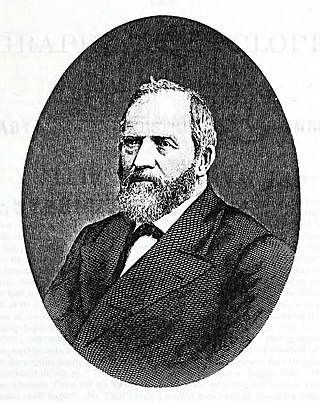
Jacob Tome was an American banker, philanthropist, and politician who died as one of the richest men in the United States. He was the first millionaire of Cecil County, Maryland, and an accomplished philanthropist, giving money to colleges, churches, and schools, including establishing the Tome School.
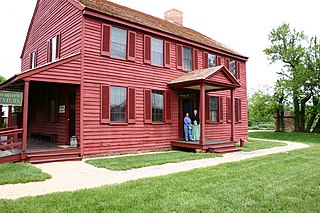
The Surratt House is a historic house and house museum located at 9110 Brandywine Road in Clinton, Prince George's County, Maryland, United States. The house is named for John and Mary Surratt, who built it in 1852. Mary Surratt was hanged in 1865 for being a co-conspirator in the Abraham Lincoln assassination. It was acquired by the Maryland-National Capital Park and Planning Commission (M-NCPPC) in 1965, restored, and opened to the public as a museum in 1976.

The Treasury Building in Washington, D.C., is a National Historic Landmark building which is the headquarters of the United States Department of the Treasury. An image of the Treasury Building is featured on the back of the United States ten-dollar bill.

1111 Pennsylvania Avenue is a mid-rise Postmodern office building located in Washington, D.C., in the United States. It is 180 feet (55 m) tall, has 14 stories, and has a four-story underground parking garage. It is a "contributing" resource to the Pennsylvania Avenue National Historic Site.

The inauguration of Andrew Johnson as the 17th president of the United States was held on April 15, 1865, on the third floor of Kirkwood House in Washington, D.C., following the assassination of President Abraham Lincoln. The inauguration marked the commencement of Andrew Johnson's only term as president. Chief Justice Salmon P. Chase administered the presidential oath of office.
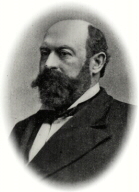
Orsamus Hylas Irish (1830–1883) was an official in the United States Department of the Treasury who served as Chief of the Bureau of Engraving and Printing from 1878 to 1883.

Raleigh Hotel was a historic high-rise office and then hotel building in downtown Washington, D.C., United States. It stood on the northeast corner of 12th Street NW and Pennsylvania Avenue.

Murder Bay was a disreputable slum in Washington, D.C., roughly bounded by Constitution Avenue NW, Pennsylvania Avenue NW, and 13th and 15th Streets NW. The area was a center of crime through the early 20th century, with an extensive criminal underclass and prostitution occurring in several brothels and hotels in the area. The area was completely rebuilt during the construction of the Federal Triangle project in the late 1920s and 1930s.

Robert Johnson was the fourth-born child of Andrew Johnson and Eliza McCardle, a lawyer by profession, one-term Tennessee state legislator, Union Army cavalry officer during the American Civil War, and Secretary to the President of the United States. Johnson suffered from severe and chronic alcohol dependence. He died by overdose of alcohol and laudanum in the family home in Greeneville, Tennessee, six weeks after the end of President Johnson's term in office.
William A. Browning, also known as Colonel Browning, was a 19th-century American political staffer. He served as a private secretary to U.S. Senator, then military governor of Tennessee, then Vice President and U.S. president, Andrew Johnson. Browning is mostly remembered today for being the recipient of a note from Abraham Lincoln's assassin John Wilkes Booth.

Andrew Johnson was drunk when he made his inaugural address as Vice President of the United States on March 4, 1865. Multiple sources suggest Johnson had been drunk for at least a week prior, he drank heavily the night before the inauguration, and he consumed either three glasses of whisky or one glass of French brandy the morning of the ceremony. Witnesses variously described Johnson's speech as incoherent, inane, self-aggrandizing, repetitive, hostile, sloppy, and overly long. He kissed the Bible when he took the oath of office, and he was too drunk to administer the oath of office to incoming Senators. The incident presaged some of Johnson's difficulties as President when he succeeded to the presidency 42 days later, following the assassination of Abraham Lincoln.
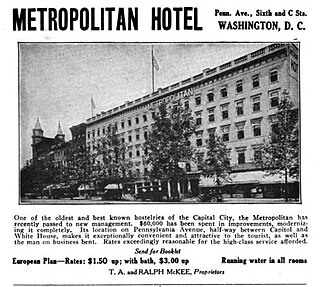
The Metropolitan Hotel at Pennsylvania Avenue and Sixth Street NW in Washington, D.C. was a major hotel of the capital city of the United States from 1863 to 1933. Built in 1850 by the heirs of Jesse Brown, the Metropolitan was "brick with marble veneer, originally five stories, approx[imately] twenty bays." In its day it was home "to many distinguished congressmen and visitors." The Metropolitan had a reputation as the hotel of politicians from the Southern states.



